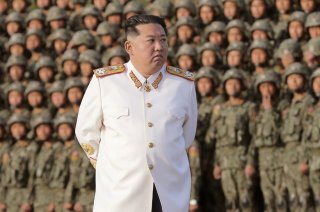The Two Musketeers? Russia’s Worrying Alliance with North Korea
North Korean weapons have reportedly been used on the front lines against Ukraine. This establishes a scary new normal, one that allows North Korea to get wartime performance feedback on its weapons.
China and Russia pose different threats to international security and stability. In fact, I would go so far as to say that China’s Belt and Road Initiative and its committed investments in Africa and elsewhere come from a national policy that really does desire peace – and to foster a positive image for Beijing. Of course, those efforts do not fit within international organizations or current norms.
But the greatest threat to peace is Russia under the Putin regime. This state is not afraid to go against the grain of what is socially acceptable. Even its seemingly impenetrable alliance with China has wavered in light of Russia’s poor performance in its war on Ukraine. The desperation to achieve victory has emaciated the Russian Federation and left it starving for a reliable alliance in a world that has formed a strong bloc against Moscow’s attempts to swallow a former Soviet Socialist Republic. Moscow has therefore stooped to a new and dangerous low by building an alliance with North Korea.
The Mutual Defense Pact between the two countries signed in June this year shocked the world. A nation at the helm of the United Nations Security Council now trades weapons and technology with the nuclear-armed Hermit Kingdom. This makes a mockery of the intentions and charter of the United Nations: to promote a universal standard of human rights, diplomatic cooperation, and inclusion, and to be an open forum that serves as a bastion against violence.
In solidifying this alliance through a bilateral framework, Russia sends a message to the world that loss of international legitimacy is an acceptable exchange for victory through strength.
North Korean weapons have reportedly been used on the front lines against Ukraine. This establishes a scary new normal, one that allows North Korea to get wartime performance feedback on its weapons. Most worryingly, while the North Koreans will likely help Russia more than Russia helps them – at least while the Russo-Ukrainian war is still raging – there is a high likelihood that the two powers will exchange nuclear munitions and materials.
North Korea has much to gain from such trade. The Hermit Kingdom is poor in reserves of nuclear material, while Russia has an abundance. By trading for Russian nuclear materials and gaining access to Russian nuclear weapons technology, North Korea will likely drastically improve and expand its nuclear weapons arsenal.
Serving as an Inspiration
Smaller, regional powers across the world abstain from attacking rival populations in fear of retaliation from the West. Putin’s disregard for the established international rules-based order gives the proverbial green light for leaders like Syrian President Bashar al-Assad, who began pummeling the city of Idlib with air assistance from Russia in 2020; or the escalating crackdowns in Iran on protests following the murder of Mahsa Amini in 2022. Inspired by Russia’s authoritarian suppression of dissent and its brutal military conduct against its enemies, Syria, Iran, and many other states now dismiss international condemnation and double down on internal repression.
Russia itself is a threat. But the domino effect, which once referred to the USSR’s policy to spread Communism to other nations, now serves a new, violent status quo.
About the Author: Lake Dodson
Lake Dodson is an Assistant Editor for the National Interest. His interests are Korean-American relations, cybersecurity policy, and nuclear energy/weapons policy. He currently studies the Korean language and has completed courses on North-South Korean Relations and conducted various experiments on an AGN-201K Nuclear Reactor at the prestigious Kyung-hee University in Suwon, South Korea. His specific interests are effective nuclear energy policy, cyber-security, and the economy and politics of East Asia. He holds a BA from the University of Mississippi.
Image Credit: Creative Commons and/or Shutterstock.


